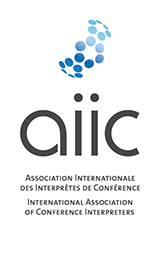
Organising a multilingual event?
With AIIC interpreters involved, event planners can be confident that the interpreting will be first-rate
AIIC has the largest pool of professional conference interpreters in the world. AIIC membership is the gold standard for conference interpretation.
AIIC Consultant Interpreters specialise in recruiting interpreters for all types of events. They can walk you through the best options for your event, freeing you up to deal with other pressing matters.
─── Before the event
Before the event
The success of your multilingual event depends on your interpreters. Preparation is key to their working effectively.
You have recruited professional conference interpreters to provide a high-quality service during your conference. Here are some guidelines to help you get the best out of the interpreting service.
Speakers
Give each speaker a copy of AIIC’s Guidelines for Speakers to help them derive maximum benefit from professional interpretation.
Documentation
Make sure the interpreters receive the conference papers, as well as any background information relating to the event, in the relevant languages, as early as possible. They will use these documents to thoroughly prepare the meeting and create their own glossaries.
Texts for discussion
When papers are circulated for discussion during the meeting, please ensure the interpreters obtain a copy in advance, if possible in all conference languages.
Briefing
Depending on the subject, it may be advisable to organise a briefing between the interpreters and the speakers.
Liaison
It is advisable to appoint one contact person who will be responsible for the liaison with the interpreters through their team leader.
Technical equipment
Ensure the equipment supplier is providing the appropriate equipment for the meeting: the required number of booths and channels, reliable equipment that meets the relevant ISO Standards, and enough receivers for all the delegates. The team leader (or consultant interpreter) and the sound engineer should check that all equipment is working properly before the meeting begins.
Projection
If videos or slides are to be shown and require interpretation, please ensure that the screen is clearly visible from the booths and that the interpreters have a direct audio feed of the video. Provide advance copies of the script or presentation to the interpreters.
Interpreters' room
If possible, make available an office or an area where the interpreters can collect documents, study conference papers, get their work schedule and pick up messages.
Equipment checklist
Simultaneous interpreting requires specialised technical equipment. This includes:
── interpretation booths (one per output language)── interpreter consoles
── a mixer and transmission system
── headset receivers and microphones for participants
── headset receivers and microphones for interpreters
Your equipment supplier and your consultant interpreter can advise you on the technical specification for your meeting.
The booths should be sound-proof and have a silent ventilation system. This will ensure better communication and trouble-free listening by delegates.
All equipment must comply with the relevant ISO standards.
─── During the event
During the event
Changes to the programme
Professional interpreters are flexible and can adapt to changes in the programme and to unforeseen circumstances.
However, the more information they have, and the earlier they get it, the better they can perform.
The team leader liaises between the conference organiser and the interpreters before and during the event, making sure they have the required documents, are aware of the meeting schedule and of any changes to the programme.
Recruiting interpreters from abroad?
The best interpreters for the job will sometimes have to travel to your conference venue. In recruiting an interpreter from another country you will need to take the following costs into account:
Visas: Delegates and interpreters may need a visa for some countries. Visa fees can be quite high. It is customary for the client to pay such fees.
Travel days allowance: For each day (or part day) needed to reach the venue and to return home, interpreters are paid a travel allowance.
Daily subsistence allowance (DSA): This covers the hotel accommodation, meals, local transport and incidental costs incurred when not at home. Conference organisers may choose to book and pay hotel accommodation for interpreters, as they do for their own staff and delegates. In that case, a reduced DSA may be paid depending on the agreed arrangement.
Airfares and travel costs: The client will either provide pre-paid tickets to interpreters or will reimburse the cost of airfares or train fares.
Ground allowance: This covers the train, taxi or bus fares to and from airports.
Your AIIC consultant interpreter will try to find interpreters with the required language combinations closest to the venue, including in the city where your meeting takes place. This can lower the total cost of interpretation considerably.
─── Case studies
Case studies
Some practical cases to help you understand the use of active and passive languages.
The Spanish car launch
An international car launch by a Spanish carmaker for journalists from Germany, France and Italy. No questions allowed. These are trade journalists who are used to getting news and information in their own language.
Journalists from Germany, France, Italy and the UK will attend the launch event. Interpretation will be provided from Spanish into German, French, Italian and English.
You will need interpretation from Spanish into German, Italian, English and French, but no interpretation from those languages back into Spanish. In interpreting terms German, Italian, French and English are active languages, Spanish is passive.
You will therefore need eight interpreters: two German-speaking, two Italian-speaking, two French-speaking and two English-speaking, each language duo alternating in 30-minute shifts.
They must all have a perfect understanding of Spanish – including automotive terms – and a perfect command of the language they interpret into, usually their mother tongue. They will have thoroughly prepared both the technical and the commercial content of the event.
The English-Russian-Polish IT meeting
An IT meeting where everyone understands English "computer-speak" but which includes Polish and Russian participants who do not feel comfortable speaking English.
You will need active English and passive Polish and Russian. You will need two English-language interpreters who can work from both Polish and Russian.
An organisation with four official languages
Your organisation's official languages are English, French, German and Spanish.
You will need active and passive English, French, German and Spanish. Participants will be able to listen and to speak any of these four languages.
The English-language interpreters will need to understand French, German and Spanish at a professional level; the French will need a full understanding of English, German and Spanish; and so on. You will need eight interpreters – two for each language.
Chinese-Italian dialogue using a relay language
(A relay language is one of the conference languages which some interpreters will be listening to when they do not understand the speaker's language. It is not always possible to find interpreters who speak all of the conference languages.)
Italian and Chinese authorities are meeting to discuss cooperation. Italian-Chinese interpreters are not available.
In this case, your consultant interpreter will propose a team of two Chinese–English interpreters and two English–Italian interpreters. When Chinese is spoken, the Italian interpreters will listen to the English translation provided by the Chinese-English interpreters and then interpret that into Italian. English in this case is a relay language, used to facilitate interpretation between two other languages.
International organisations
At most international conferences interpretation is offered in the official languages of the organisation. The UN uses six official languages at its meetings: English, French, Spanish, Russian, Arabic and Chinese.
The EU uses 24 official languages at some of its meetings; at others it uses fewer, with several in passive form. International federations and associations often have two or more official languages.
Session-specific languages
Not all sessions at a conference need the same languages. In the example above of an organisation with English, French, Spanish and German as official languages, for instance, the Budget Committee may have only German- and English-speaking members and there may be no need for its meetings to have French and Spanish interpretation.
Photo: Kane Reinholdtsen / Unsplash
